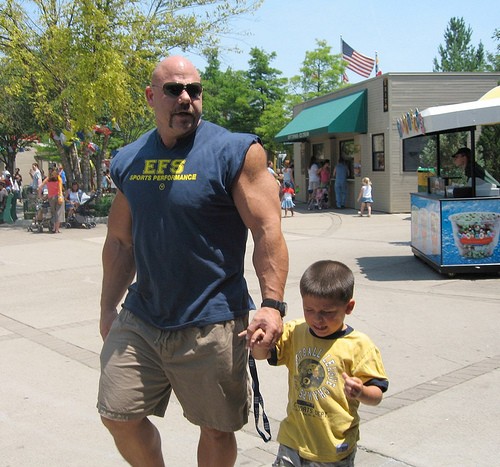
Originally published in October 2011
I've spent the last couple of days tapping out a “business tip of the week” post and, after doing some research, discovered that I was walking a very fine line on copyright infringement. It wasn't that I copy-and-pasted the material, but I signed a contract many years ago when I hired the consulting firm that taught me the material that I would not share in any way. I will find a different way later to touch on that concept.
I'm going to go out on a limb here and posting something I'm not really comfortable with, but I respect the person that asked me to do it. He feels there's a need for someone like me to write this type of material.
I guess we will find out soon enough.
The topic deals with my son, who has special needs (Asperger's Syndrome). I've posted about this once before and may never post again, so here are a few quick tips I will pass along.
I used to hate the term "special needs," but now I can't stand people who say they hate the term. After nine years, if there is one thing I know for a FACT, it's that my son has special needs!
READ: Throw Out Your Expectations
While all kids are different, and each requires their own set of needs, I'm willing to bet those with autism fall outside the spectrum in this regard. If you are a new parent coming into this situation, you need to come to terms with this because it's a fact, and the sooner you know, quit denying, placing blame, and expecting someone to have all the answers, the better parent you will be.

I will also go as far as to say that unless you have or care for a child with special needs, you have NO IDEA what the term special needs really means. You might think you do but trust me - you don't. Sit down with someone who has one of these kids and ask them to speak candidly. You will gain a MUCH better perspective of what this means.
Does this mean I feel having "special needs" means these children are "special" or better than others?
No, not at all.
ALL kids are special - they are our future!
There is nothing MORE special than our children, but some DO have needs that fall outside the normal spectrum.
Here a few tips that have helped me work on being a better parent.
- Learn all you can about sensory processing disorder. While this may not be the cause, there are several things that can make a big difference. Anytime you can learn more about how your child processes, the better. Simple things like pressure, spinning, bouncing, loading, straining, jumping, etc. can help to avoid or defuse a situation very fast.
- There is no point in trying to figure out what is making them, or made them, upset after the breaking point has been reached. If they are on the floor screaming in a fit, they have already forgotten what got them so upset in the first place. The more you probe, the more confused and upset you will make them.
- Regardless of how bad the situation is, let them know you love them but don't like their specific behavior. They need to learn that they are not their behaviors.
They are NOT bad kids,they are NOT Angry Birds, they are NOT confused kids, they are NOT crazy, they are NOT any of these "behaviors" – they are loved children first and ALWAYS.
- Determine what the problem is if they can't or won't do it. There is a big difference and if you take the time you will find out what they are really capable of. They can and will surprise you, but at the same time, never assume.
- Know when to fight and when to sit back. The school system, family and other outside factors can become VERY stressful. Most of the time, it's best to just sit back and keep your mouth shut, but when it does come time to speak, make sure you are heard and your point is clear. This is where effective communication is extremely necessary because there is no way to deal with this without emotion or take it personal. Practice what you will say, seriously.
There may come a time where you do need to be aggressive, pissed and emotional, but this is a card you rarely want to play and should only do so if it is the last option on the table.
- You will make mistakes. I can't begin to count the number of things I've done wrong, words I shouldn't have said, things I shouldn't have done, fights that could have been avoided, and frustrations that were blown way out of proportion. I can't go back and change any of these things but I can learn from them, move forward, and become a better father.

I have always refused to harp on any mistakes I've ever made (or will make) and will keep my focus on what is best for my family. This way, the next time I fail, I can get right back on track because isn't THIS the real lesson we want to teach our children? Isn't this what we want them to SEE?
Angry Birds knock things down but if you look closely, you will see the structure is rebuilt strong(er) when you move to the next level.
The birds don't do this.
The players don't do this.
It's all in the "programming," isn't it?
What lessons are WE programming with the examples we set?
I'm sure I could write hundreds of these but I will stop for now because I'm not sure I want to continue going down this road.
I've read many articles and books on autism, mostly by women.
I’ve spoken to many doctors, counselors, and teachers who were also mostly women.
I haven't seen very much written by men and even less written by meatheads.
ENTIRE SERIES
- Under The Bar: They are NOT Angry Birds!
- Under The Bar: They are NOT Angry Birds! pt.2.1
- Under The Bar: They are NOT Angry Birds! pt.2.2
- Under The Bar: They are NOT Angry Birds! pt.3
- Under The Bar: They are NOT Angry Birds! You Are the Parent
- Under The Bar: They are NOT Angry Birds! The Monster Within Special Education
- Under The Bar: They Are NOT Angry Birds! The Fight for Funding
- Under The Bar: They are NOT Angry Birds! The Holidays
- Under The Bar: They are NOT Angry Birds! Unleashing The Fury
- Under The Bar: They are NOT Angry Birds! Driven
- Under the Bar: Fathers and Children with Disabilities
- They are NOT Angry Birds! Normalcy?










I appreciate you sharing something so personal to a large audience. I recently found this blog after watching your documentary in regards to your son on YouTube. It has inspired me to write out my own feelings and emotions as I am not the best at sharing my feelings openly. My son who is turning (4) in April and daughter who is turning (2) in April have both been diagnosed with Autism. I love them to pieces. There are plenty of challenges and struggles my wife and I have faced together and will continue to face. One of the biggest issues is finding resources for the kids. We have already provided them a great deal but we want so much more as any parents does. I appreciate you giving voice to this topic as I find a sense of peace reading through your words.
Thank you for the encouragement Dave whether intended or not. Keep working hard. I love the EliteFTS brand, product and message. Take care!
This is an absolutely beautiful article! I can’t stress this enough!!! This is something EVERY parent of a child with special needs should read...and I truky mean this, coming from a special education teacher background. I commend Each and every one of you that strive to give your children (as any parent should) the absolute BEST life has to offer. I am not a parent, but from my years of teaching, I can tell you this-Chikdren are a blessing, regardless of whatever life brings. There isn’t any wrong or right way to parent, as long as your chikd’s needs (physically and emotionally) are being met to the best of your ability. It takes a special kind of parent to be blessed with a child or children with special needs. Embrace the journey. It sounds like you are...and thank you for eloquently depicting what it is like to be in your shoes. Best wishes to you and your family!